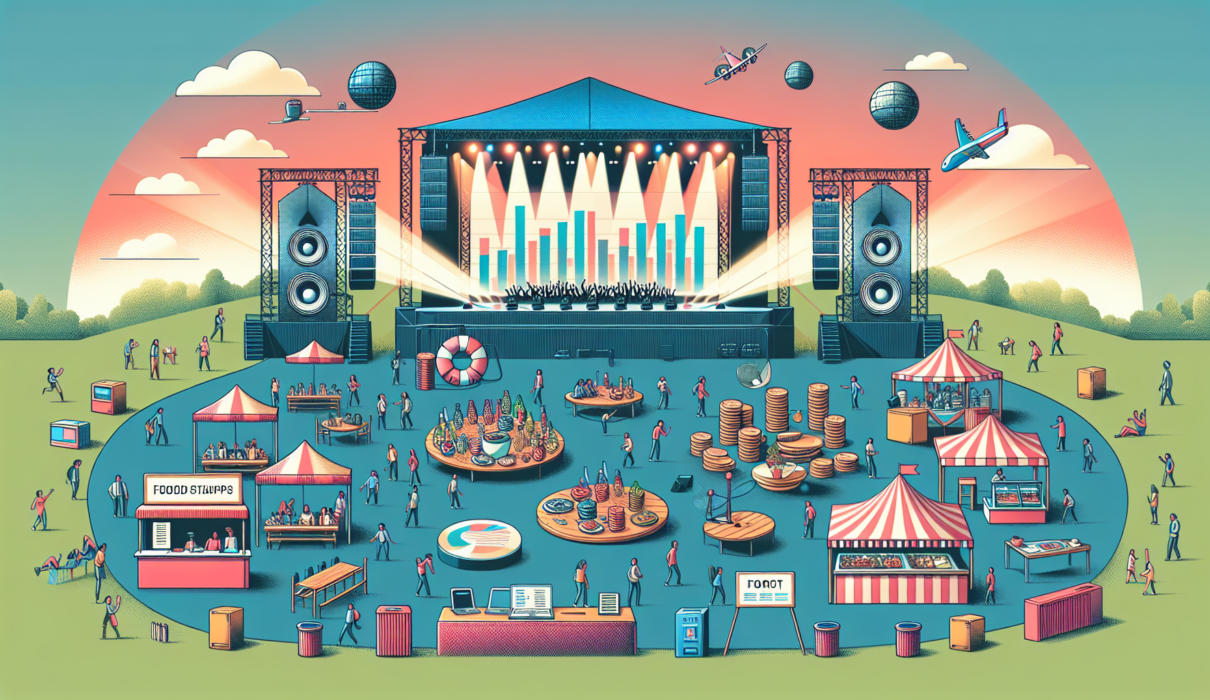Understanding Music Festival Budgets
So you’re dipping your toes into the world of ticket reselling and wondering how much a music festival sets back its organizers? Strap in, folks! Grasping the budget’s ins and outs can make or break your ticket pricing game and send your profits soaring. Let’s get into why it’s smart to have a budget and what makes festival costs sneakily climb.
Importance of Budgeting
A tight budget is your festival’s VIP pass to success. It lines up everything from paying performers to spreading the word. Think of it as your financial safety net that says, “Nope,” to overspending and keeps the risks at bay.
Kicking things off, you should know that the bills can rack up anywhere from a modest $100,000 to a jaw-dropping half-million or even more, all hanging on the size and fanciness of the event (source). Nailing your budget game means having funds ready for those pesky surprise costs, letting the festival groove along without hiccups and leaving room for some profit dance moves.
Factors Influencing Festival Costs
Wondering what makes the festival bill balloon? Here’s a peek at the top offenders:
Venue and Permits
Finding a spot and snagging permits is your festival’s opening act of expenses. Based on where and when you throw the shindig, costs can roll in for land rental, security, parking, cleanliness, insurance, and those pesky taxes. Gotta do your homework and haggling right to strike a deal with owners and local bigwigs (LinkedIn).
Artist Booking Fees
The splashiest cash eater? Artist fees. They can swoop anywhere from $30,000 all the way to a whopping $200,000, all hinging on how big a name you’re landing (source). The bigger the star, the bigger the crowd—and your empty wallet!
Marketing and Promotion
Marketing guzzles up about 20% to 30% of the budget to shout your festival from every rooftop. Between splashing ads on social media and old-school print, expect to cough up between $10,000 and $50,000 (source). Promote like a pro, and you’ll see the crowd come running.
Insurance Expenses
Insurance isn’t the fun bit, but it stops the festival from going up in smoke when things go sideways. Shell out around $2,000 to $5,000, based on how grand the affair is (source). Think of it as your shield against legal curveballs.
| Expense Category | Cost Range |
|---|---|
| Venue & Permits | Changes by the minute |
| Artist Booking Fees | $30,000 to $200,000+ |
| Marketing & Promotion | $10,000 to $50,000 |
| Insurance | $2,000 to $5,000 |
Getting a handle on these costs lets you appraise festival tickets wisely and map out your ticket reselling tactics. For more ways to step up your game, check out how to resell tickets and see where the law stands with is ticket reselling legal.
Laying down these expense cards helps you puzzle out the festival budget and make spot-on calls for reselling tickets.
Need more street smarts on selling tickets? Dive into our guides on the best ticket resale sites and best ticket reselling apps.
Major Expenses in Music Festivals
Let’s chat about those sneaky costs behind putting on an unforgettable music festival. If you’re thinking about diving into the festival biz or just nosy about where all that cash goes, I’ve got the scoop for you.
Artist Booking Fees
Getting the big names up on stage is gonna eat up a chunky slice of your budget pie. Prices jump around depending on how many Spotify streams they have or whether they’ve ever been a guest judge on “The Voice.” Your top-deck stars can clock in somewhere between $30,000 to over $200,000 (Business Plan Templates). If you’re a ticket-flipping whiz, knowing what these artists cost could save you a buck or help you make a quick resale.
| Artist Level | Booking Fee Range |
|---|---|
| Small Acts | $5,000 – $10,000 |
| Mid-Tier Acts | $30,000 – $75,000 |
| Headliners | $100,000 – $200,000+ |
Marketing and Promotion Costs
Here we have the schmooze and dazzle bit. You want people lining up for your festival like it’s the last hot dog at a backyard BBQ. We’re talking spending around 20% to 30% of your stash on spreading the word. Social media shoutouts, eye-catching print, and flashy online ads can run you $10,000 to $50,000 (Business Plan Templates).
| Marketing Medium | Estimated Cost |
|---|---|
| Social Media | $5,000 – $20,000 |
| Print Advertising | $3,000 – $15,000 |
| Online Ads | $2,000 – $10,000 |
For those swapping ticket stubs, keeping your finger on marketing tricks means you can suss out if your tickets are flying off or gathering dust. Peek into how to resell tickets if you wanna get the upper hand!
Insurance Expenses
The legal mumbo jumbo. Insurance—can’t skip this if you wanna sleep at night. It covers incidents from slips and falls to catastrophic events where the headliner cancels due to a hangnail. Costs run between $2,000 to $5,000.
Insurance typically covers:
- General liability
- Event cancellation
- Property damage
- Worker’s compensation
Whether you’re looking at music festivals as your next investment playground or just wanna be prepared, knowing where the dollars go helps. Keep this in mind when you’re planning your budget—especially if you’re thinking about buying those pricey tickets hoping to make some dough with a quick resale. Check out ticket pricing tools to stay a step ahead in predicting and tweaking prices.
So, whether you’re all about jumping from festival to festival, shining your glowstick, or lookin’ to turn a profit on ticket sales, being in the know about these pricey bits helps prevent any unwanted surprises.
Revenue Generation & Profit Margins
Putting together a hit music festival means thinking smart about where your money’s coming from and where it’s going. From my experience, the big money makers at these events are ticket sales, sponsorships, merchandise, and food or drink sales. Let’s take a closer look at each of these.
Ticket Sales Revenue
Ticket sales are usually the cash cow for a music festival. Get this—in 2023, the music events scene is expected to rake in about $30.14 billion in the U.S., with each festival-goer shelling out around $99.77. And by 2025? That number’s expected to jump to an average of $108.50 per person (Eventbrite).
| Year | Average Revenue per Concertgoer |
|---|---|
| 2023 | $99.77 |
| 2025 | $108.50 |
You want to haul in enough dough from ticket sales to cover all those festival costs. Using things like dynamic ticket pricing, early sales, and sneaky presale codes can help. When everyone wants in, nudging up the ticket price can really fatten the wallet.
If you’re into the ticket reselling game, knowing when tickets drop is gold. Here’s a hot tip: figuring out how to transfer mobile tickets makes life easier for both sellers and buyers.
Sponsorships and Merchandising
Sponsorships can line your pockets nicely; companies love festivals to push their goodies and connect with their crowd. Locking in solid deals with sponsors can pretty much cover your event costs, leaving money on the table for bigger acts and cooler marketing.
Swag, or merchandise, is another gold mine. Exclusive stuff like T-shirts, caps, and posters not only bulk up revenue but also spread the word about the festival. Those limited-edition bits? They fly off the shelves, especially with cool designs or the lineup plastered on them.
Don’t skip online and on-site sales for merch to hit max sales numbers. Teaming up with popular ticket reselling platforms might even give you a chance to bundle merch with VIP tickets, pushing those profit margins even higher.
Concessions and Food Sales
Despite being easy to overlook, food and drink sales can be a revenue rocket. Offering a wide range of eats keeps folks around longer, encouraging more on-the-spot spending. Vendors, whether they’re on a shared-revenue deal or paying upfront, support the financial load.
Designing distinct food areas with everything from gourmet dishes to quick eats caters to every appetite and wallet size. Highlighting local flavors and unique offerings can make your festival stand out and keep attendees coming back for more.
| Revenue Source | Percentage of Total Revenue |
|---|---|
| Ticket Sales | 60-70% |
| Sponsorships | 20-25% |
| Merchandising | 10-15% |
| Concessions | 5-10% |
Pairing these cash channels with smart financial planning and a killer strategy will stretch your [music festival budget] to its fullest. Look into our detailed guides on how to resell tickets and ticket pricing tools for more moneymaking tips.
By really getting how these money sources work and putting the right plans in action, ticket flippers and event planners can make smart calls that boost earnings and make sure festival-goers have a time they won’t soon forget.
Financial Challenges and Considerations
Organizing a music festival is like playing a high-stakes game of Monopoly. Sure, it can lead to significant payoffs, but you’ll probably hit a few snags along the way. Let’s dive into some of these pesky hurdles, like having festival losses and those ever-growing ticket prices.
Initial Festival Losses
Imagine you’re throwing a massive block party, but instead of your neighbors showing up, you get crickets. That’s kinda how it feels when a new music festival starts bleeding money. These losses aren’t just hearsay—it’s common for a festival to be in the red for three to five years before hitting the green zone. If you’re into event ticket reselling & trading, you’ve gotta get that these early losses are just part of the deal.
Smaller festivals are like that one friend who passes on pizza toppings—there’s just not much meat on those bones. We’re talking profit margins in the measly 5 to 10 percent range. If you’re a reseller savoring a juicy cut, you might wanna cool your jets with fledgling events.
Here’s a little cheat sheet on festival size and their not-so-lavish margins:
| Festival Size | Average Profit Margin |
|---|---|
| Large Festivals | 15-30% |
| Medium Festivals | 10-15% |
| Small Festivals | 5-10% |
Rising Ticket Prices
Ah, ticket prices—always climbing like they’re on an escalator to nowhere. Festival organizers tackle inflation by hiking ticket costs. Back in 2022, snagging a concert ticket cost a whopping $103.71 on average, reflecting a chunky 19 percent increase since 2019, thanks to our pals at Pollstar.
Higher ticket prices are a mixed bag for buyers and sellers alike. For resellers, more expensive tickets mean higher initial cash outlay—you’ll probably have to scribble bigger numbers on those checks. But hey, that can also mean higher resale prices, just watch out for buyer’s remorse or the market’s cold shoulder.
According to brainiacs at Eventbrite, 2023 saw concertgoers spending $99.77 per ticket with expectations to cough up $108.50 per ticket by 2025.
| Year | Average Revenue per Concertgoer |
|---|---|
| 2023 | $99.77 |
| 2025 | $108.50 |
Festival planners are turning to early-bird deals like they’re selling pumpkin spice lattes in the fall. Many fans are holding off on buying tickets until the last possible moment because, well, life’s not getting any cheaper. This leaves organizers in the dark, revenue-wise.
As a savvy ticket hustler, getting your hands on early-bird tickets can be gold. These tickets usually come with a sweet discount, which resellers can turn into a paycheck. Staying ahead of the game includes knowing when concert tickets go on sale.
Wising up to these money woes can save both newbies and seasoned ticket flippers from the pitfalls of the event ticketing gig. For the inside scoop on making a buck from ticket reselling, check out our guides on how to resell tickets and understanding ticket pricing tools.
Key Ingredients for Music Festival Awesomeness
Planning a music festival? Let’s chat about what makes it rock! In my book, it’s all about nailing the lineup, keeping things green, and getting cozy with tech. You gotta get your music festival budget working for you!
Crafting the Perfect Lineup
Let’s be real, a killer lineup is where it all starts. Mix some big names with fresh faces and match it with your funds. Betting on a blend of genres pulls folks from all over. In other words, a playlist that kicks everyone’s socks off.
An inclusive lineup that features diverse artists – whether it’s their music style, culture, or gender – isn’t just a nice-to-have; it’s a winner. A big crowd means more ticket sales and a party vibe. Check out how to get it just right with our guide on choosing music festival.
Green Vibes Only
Nowadays, you gotta keep it clean, folks. Festivals are hopping on the eco-friendly train, pushing for clean power like the sun and wind to lighten their footprint on the planet. More importantly, recycling, ditching those pesky single-use plastics, and living by a ‘Leave No Trace’ mantra are no-brainers for keeping it green (FestivalPro).
| Eco Moves | Why They’re Cool |
|---|---|
| Clean Power | Kiss goodbye to a heavy carbon load |
| Recycling Zones | Waste management on point |
| No More Plastics | Save the turtles, and all that |
| Leave No Trace | Spotless vibes |
Being eco-savvy not only keeps Mother Earth happy but draws in the crowd who’s all about sustainable shindigs. Peek at our best festival essentials for a green festival tip-off.
Tech Savvy and Loving It
Integrating tech? Heck yes! Bring in stuff like slick ticketing, cashless pay, and RFID to make everyone’s life easier. Solid Wi-Fi and festival apps are golden buddies, handing out schedules, venue maps, and exclusive offers (FestivalPro).
| Tech Toys | The Upsides |
|---|---|
| Smooth Payments | Quick cash flow |
| Cashless Moolah | Safer, happier pockets |
| RFID | Keep those crowds chill |
| Wi-Fi Mastery | Info at your fingertips |
These gadgets can really up your game, shave off wait times, and fill your coffers. Dive deeper with our gadgets and gizmos in our event forecasting tools.
Stick to these pointers, and you’re all set for a festival experience that’s as smooth as a vinyl record. For extra wisdom on setting up a fab festival, tiptoe over to our articles on best festival camping gear and solo festival safety.
Keeping the Music Festival Grooving
Running a music festival without a hitch doesn’t just happen by luck. You gotta hit the right notes for fun and safety for everyone there. Keep an eye on the big stuff: getting the logistics right, securing the place, and making sure everyone can join the fun, no matter what.
Nailing the Festival Logistics
Alright, here’s the scoop on logistics. You’ve gotta have a killer plan, like, no room for flubs. Ticket reselling? Yeah, you need a rock-solid plan for that too. Here’s my take on what matters most:
-
Pickin’ the Perfect Spot: The venue’s gotta fit the crowd and the vibe. Think parking, wheelchairs, and not packing folks in like sardines. Need tents for camping? Our best festival tents guide is your jam.
-
Scheduling: Line up each second from setup to teardown. Everyone should know their gig on the timeline.
-
Crew and Volunteers: Stack your team with trained folks who can handle everything from ticketing to saying “keep moving” in nice ways.
-
Tech Magic: Harness tech like easy-pay options, RFID gizmos, and cool apps to streamline the action (FestivalPro). Curious about tickets? Peek at our piece on best ticket reselling apps.
Rock-Solid Safety
Safety isn’t just a word—it’s gotta be in your bones when running a festival. You gotta pay for it, plan for weather mood swings, and human hiccups. Here’s how I roll:
-
Security Squad: Get the best folks to check tickets, watch over the big stages, and keep eyes on the crowd.
-
Medical Backup: Have those med tents ready and easily spotted. And, toss in enough staff and supplies for first-aid emergencies.
-
Risk Backup: Insurance is your ally here—protect against mishaps, acts of God, and the unknown.
-
Plan B: Craft and broadcast clear what-to-do-when things go sideways, like quick exits or medical emergencies. For personal safety nuggets, our solo festival safety tips have some neat tricks.
Making It Everybody’s Festival
Everyone should have a blast at the festival, including folks who need a bit of extra help. Doing this well boosts your festival’s image and gets everyone talking in a good way.
-
Accessible Stuff: Make sure stages, restrooms, and chill spots welcome people with physical disabilities (LinkedIn).
-
Helping Hands: Offer sign language translators, braille menus, and sensory zones.
-
Getting There and Back: Plan easy transport options for everyone hitting up or leaving the festival. View our festival transportation tips for more nuggets.
-
Invite the World: Use promos that show your festival is for everyone, with images and words that scream “all are welcome.”
Stick to these tips, and your festival will be the talk of the town, leaving everyone high-fiving over great tunes and good times.



